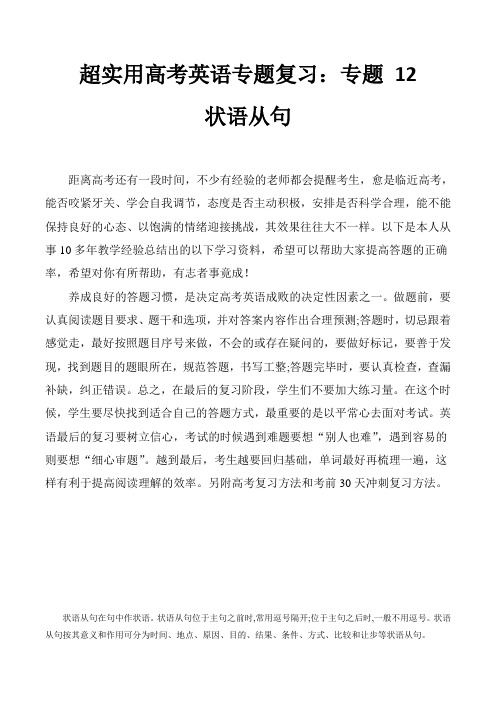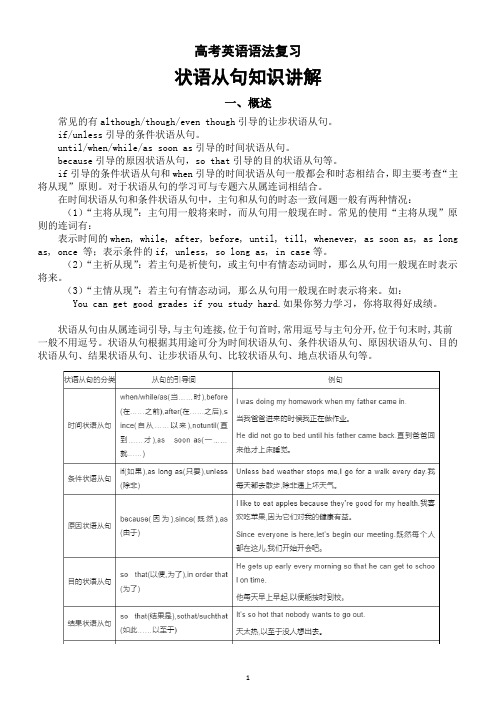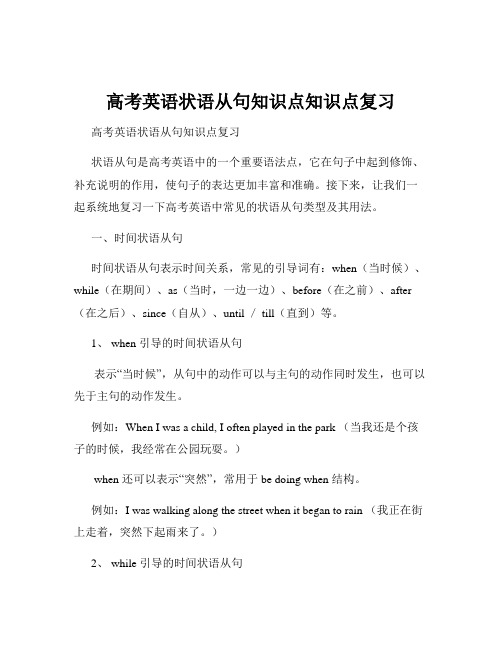状语从句——高考英语专题复习
- 格式:doc
- 大小:66.00 KB
- 文档页数:7

高三英语总复习之句子系列复习(4)状语从句一、常见状语从句简介概说:由从句担任的状语,在句子中可修饰谓语(或其它动词)、形容词、副词或是整个句子,它可以用来表示时间、地点、原因、目的、结果、条件、方式、比较、让步等。
状语从句是一较大的语法项目,也是近几年高考题中常见的一个重要试点。
高考中已考查了时间、让步、地点、条件、目的等状语从句,这些从句仍是今后高考热点,应作充分准备。
(一)时间状语从句表示时间的状语从句可由when, as, while, whenever, after, before, till (until), since, once, as soon as (或the moment ), by the time, no sooner … than, hardly (scarcely) … when, every time等引导。
e.g. When I came into the office, the teachers were having a meeting.He started as soon as he received the news.Once you see him, you will never forget him.No sooner had I gone to bed than I went to sleep.(二)原因状语从句原因状语从句是表示原因或理由的,引导这类从句的最常用的连词是because, since, as , now that(既然)等,for 表示因果关系时(它引导的不是从句)为并列连词,语气不如because强。
e.g. He is disappointed because he didn't get the position.As it is raining, I will not go out.Now that you mention it, I do remember.(三)地点状语从句引导地点状语从句的连词是where 和wherever等。



状语从句状语从句在高考试题中由于其他从句的干扰,以及倒装句,强调句的介入,使得状语从句更为复杂状语从句是一种副词性从句,通常由一个从属连词或一个起连词作用的词组引导状语从句1 时间状语从句常见的连词(组):when, while, as, befre, after, nce, till, until, as sn as, nw that, hardly when, scarcely when, n sner than等可以引导时间状语从句的副(介)词(短语)或名词短语:directly, instantly, iediately, by the tie, the ent, the secnd, the inute, the instant, every tie, each tie, net tie, the last tie等注意点如下:(1) when, while, as引导的时间状语从句as表示“当……的时候”,往往和when/ while通用,但它着重强调主句与从句的动作或事情同时或几乎同时发生when(at r during the tie)既可以表示在某一点的时候,又可以表示在某一段时间内,主句与从句的动作或事情可以同时发生也可以先后发生while强调一段时间,仅表示从句和主句的动作同时发生,并且有延续意义,该从句中的动词一般要用延续性动词,从句中常用过去进行时态或一般过去时态;当when表示a perid f tie时,两者可以互换She cae up as I was cing(同时)在我做饭时,她走了过When we were at schl, we went t the library every day(在一段时间内)当我们在学校时,每天都去图书馆While they were watching TV, I was preparing yself fr the cing eainatin他们在看电视,而我在为即将到的考试做准备Strie while the irn is ht 趁热打铁( 不可用as或when,这里的while意思是“趁……”)一、when可以和延续性动词连用,也可以和短暂性动词连用;而while和as只能和延续性动词连用① Why d yu want a new jb when yu've gt such a gd ne already?(get为短暂性动词)你已经找到如此好的工作,为何还想再找新的?②Srry,I was ut when yu called e.(call为短暂性动词)对不起,你打电话时我刚好外出了③Strie while the irn is ht.(is为延续性动词,表示一种持续的状态)趁热打铁④ The students t ntes as they listened.(listen为延续性动词)学生们边听课边做笔记二、when从句的谓语动词可以在主句谓语动作之前、之后或同时发生;while和as从句的谓语动作必须是和主句谓语动作同时发生1.从句动作在主句动作前发生,只用 when①When he had finished his hewr,he t a shrt rest.(finished先发生)当他完成作业后,他休息了一会儿②When I gt t the airprt,the guests had left.(gt t后发生)当我赶到飞机场时,客人们已经离开了2.从句动作和主句动作同时发生,且从句动作为延续性动词时,when,while,as都可使用①When /While /As we were dancing,a stranger cae in.(dance为延续性动词)当我们跳舞时,一位陌生人走了进②When /While /As she was aing a phnecall,I was writing a letter.(ae为延续性动词)当她在打电话时,我正在写信3.当主句、从句动作同时进行,从句动作的时间概念淡化,而主要表示主句动作发生的背景或条件时,只能用 as这时,as常表示“随着……”;“一边……,一边……”之意① As the tie went n,the weather gt wrse.(as表示“随着……”之意)② The atsphere gets thinner and thinner as the height increases.随着高度的增加,大气越越稀薄③As years g by,hina is getting strnger and richer.随着时间一年一年过去,中国变得越越富强了④The little girls sang as they went.小姑娘们一边走,一边唱⑤The sad ther sat n the radside,shuting as she was crying.伤心的妈妈坐在路边,边哭边叫4.在将时从句中,常用when,且从句须用一般时代替将时①Yu shall brrw the b when I have finished reading it.在我读完这本书后,你可以借阅②When the anager ces here fr a visit net wee,I'll tal with hi abut this.下周,经理这参观时,我会和他谈谈此事三、when用于表示“一……就……”的句型中(指过去的事情)sb.had hardly(=scarcely) dne sth.when...=Hardly / Scarcely had sb.dne sth.when...①I had hardly /scarcely clsed y eyes when sene nced at the dr.=Hardly / Scarcely had I clsed y eyes when sene nced at the dr.我刚一闭上眼,就有人在敲门了②I had hardly /scarcely entered y r when the telephne rang.=Hardly /Scarcely had I entered y r when the telephne rang.我刚一走进房门,电话就响了(2) befre引导状语从句时的常见重点句型①It will (nt) be befre还要……才,要不了多久就……It was (nt) befre 过了……才(没多久就……)It was a lng tie befre I gt t sleep过了好长时间我才睡着了It wasn t lng befre he tld e abut the news没多久他就告诉了我那条新闻②不等……就……;在……之前就……The telephne rang ff befre I culd answer it我还没得及接电话,电话就挂断了③刚……就……He hardly entered the r befre he heard the telephne ring他刚进屋电话铃就响了④先……再……Yu can have a few days t thin abut it befre yu ae yur decisin做决定之前你还有几天时间考虑(3)since 引导的从句用延续性动词的过去式(包括过去完成时)时,则从句的动作已经结束,从句意思是否定的如果从句的动词是延续性动词的现在完成时态,则从句意思是肯定的He has never been t see e since I was ill我病愈后,他一直未看我(不再生病了)He has never been t see e since I have been ill我病了,他一直未看我I haven t heard fr hi since he lived here自他从这里搬走,我就没有收到他的信(不住在这儿了)(4) till, until如果till与until用在肯定句中时,则主句中谓语动词部分所表示的动作或状态一直延续到某时或某个动作发生时才结束注意它的倒装句和强调句I didn t recgnize she was y classate until she t ff her dar glasses=Nt until she t ff her dar glasses did I recgnise she was y classate=It was nt until she t ff her dar glasses that I recgnised she was y classate直到她摘下墨镜,我才认出她是我的同学2 原因状语从句引导原因状语从句的常见连词或短语:as, because, since, nw that, cnsidering that, seeing that(鉴于……)注意以下几点:(1) because, since, as, fr, nw thatbecause语气最强,用于回答why的提问,可与强调词nly, just 以及否定词nt 连用但不可以与s连用since 引导的从句语气次于because引导的从句,常表示稍加分析后而推断出的原因,或指人们已知的事实,比as正式一些,常置于句首as 语气最弱,其原因只是对结果的附带说明,一般放在句首fr虽然解释为“因为”但只是一个并列连词,它也常引导句子表示原因,但不是原因状语从句,它是一个并列句fr所提供的理由是一种补充性的说明,表示推测的理由nw that意为“既然,由于”表示由于人们已知的事实或正在发生的事而产生某个结果He failed because he was careless他因粗心而失败了Since everyne has ce, let s begin ur eeting既然大家都了,我们开会吧As all the seats were full, he std there所有的座位都满了,他只好站那儿It ight have rained last night fr the grund is wet昨晚可能下雨了,因为地面是湿的Nw that the ids have left he we have a lt f etra space由于孩子们离开了家,所以我们有了额外的空间3 地点状语从句地点状语从句常由下列连词引导:where, wherever等Yu ay find hi where his brther lives你可能会在他哥哥居住的地方找到他Yu are free t g wherever yu lie你可以去你想要去的任何地方Anywhere he went, he gt war welce无论他走到哪儿,都受到热烈欢迎The girl taes the dll with her everywhere she ges这个女孩无论去哪都带着她的布娃娃Where there is a will, there is a way 有志者事竟成4 结果状语从句结果状语从句常由下列连词引导:s that,such that,s that等要注意以下几个问题(1) 五种结构:①s+adj/adv+that②such (a/an+adj)+n+that③s+adj+a/an+n+that=such a/an+adj+n+that④s any/uch/few/little(少)+n+that⑤such+(adj) +n (u/pl)+ thatHe spe s fast that I culdn t fllw hi他说的如此的快,我跟不上他It was such a lvely day / s lvely a day that we all went swiing今天天气如此的好,我们大家都去游泳了(2) s或such置于句首时,主句常用倒装It was such a lvely day / s lvely a day that we all went swiing=Such a lvely day was it that we all went swiing今天天气如此的好,我们大家都去游泳了(3)注意以上结构与定语从句s/such as的区别This is such an interesting/s interesting a fil that everyne wants t see it这是一部很有趣的电影以至于每个人都想去看5 目的状语从句目的状语从句由下列连词引导:s that, in rder that, fr fear that, in case等(注:s that也可用引导结果状语从句)s that, in rder that引导的目的状语从句中常需用情态动词s that引导的目的状语从句只能放在主句之后in rder that 引导的目的状语从句可以放在主句之前或之后We set ut early s that we culd see the sunrise我们很早出发以便能看到日出He sent the letter by air ail s that it ight reach the in tie他空邮这封信以便他们能及时收到6 条件状语从句条件状语从句分为真实条件句和非真实条件句(用在虚拟语气中)注意:在真实条件句中,常用一般时态代替将时常由下列连词引导条件状语从句:if, unless, suppse, suppsing, prviding (that), prvided (that), given (that), in case, n cnditin that, as lng as, s lng as, s far as等(1) unless=if ntYu will fail unless yu study hard除非你努力,否则你就要失败(2) suppse, suppsing, prviding(that), prvided(that), given(that)= ifGiven that he supprts us, we ll win the electin如果他支持我们,我们就会赢得选举(3)n cnditin that, as lng as, s lng as = nly ifAs lng as yu dn t lse heart, yu will succeed只要你不灰心,你就会成功(4) as(s) far asS far as I a cncerned, I in favur f “ercy illing”就我个人而言,我支持安乐死7 让步状语从句引导让步状语从句的连词:althugh, thugh, as, even if, even thugh,while, whether r, whever, whatever, hwever, n atter+疑问词等注意以下几点:(1) althugh, thugh引导让步状语从句时,主句前不能用but,但可以加yet, stillThugh it was raining hard, yet they didn t stp wring尽管下着大雨,他们仍然在工作(2) as引导让步状语从句时,必须用前置结构,通常是从句中的表语、状语或动词原形放在句首,放在句首的名词前的冠词要去掉Thugh he is a child, he nws a lt=hild as(thugh)he is, he nws a lt尽管他是个孩子,但他仍知道的很多(注意在child前不要用冠词)Thugh I lie it very uch, I wn t buy it=Much as I lie it, I wn t buy it尽管我非常喜欢它,但我也不会买它(3)whether r (nt ) 引导的从句,提供两个对比的¡°尽管¡±情况,含有条件意味(Whether yu)Believe it r nt, it is trueWhether yu ce here r we g there, the tpic f discussin will reain unchanged不管是你这儿还是我们去那儿,讨论的主题保持不变(4) 疑问词+ever=n atter +疑问词Whever yu are, yu ust shw yur pass无论你是谁,你都必须出示你的通行证Whenever yu ce, yu are welce8 方式状语从句引导方式状语从句的连词或短语:as, as if, as thugh,the way等注意以下几点:(1) as引导方式状语从句时意为¡°按照¡±,¡°如同¡±,前面常用加强语气I did it just as yu tld e = I did it just as tld t我是按照你的吩咐做的He didn t win the atch as epected(2) as if和as thugh 引导的从句中,谓语常用虚拟语气,有时也用陈述语气It sees as if it were ging t rain(3)连词while 和whereas 可以表示对比Whereas he is rather lazy, she is quite energetic注意状语从句中的省略现象(1) 连接词+过去分词Unless repaired, the washing achine is n use(2) 连词+现在分词L ut while crssing the street(3)连词+形容词/其他常见的有if necessary,if pssible,when necessary,if any等(4) 比较状语从句中的省略He arrived he half an hur earlier than (he had been) epected例1My parents dn’t ind what jb I d I a happy(2009•陕西)A even thughB as sn as as lng as D as thugh解析:选考查状语从句根据题干意思可知,此处是条件状语从句as lng as只要;even thugh引导让步状语从句,意为“即使”;as sn as引导时间状语从句,意为“一……就……”;as thugh引导方式状语从句,意为“仿佛,好象”例2—Shall we have ur picnic trrw?—it desn’t rain (2009•山东)A UntilB While Once D If解析:选D考查交际用语答句句意为:如果明天不下雨的话例3She had just finished her hewr her ther ased her t practise playing the pian yesterday(2009•福建)A whenB while after D since解析:选A考查状语从句由句意可知,此处when用作并列连词,意为“这时”例4Yu d better nt leave the edicine ids can get at it(2008•山东)Aeven if Bwhich where Ds that解析:选句意为:你最好不要把药放在小孩子够得着的地方where引导地点状语从句even if 即使;which 不引导状语从句;s that 为了;以至于;引导目的或结果状语从句例5There were se chairs left ver everyne had sat dwn(2008•四川)A whenB until that D where解析:选A句意为:大家都坐下之后,还有一些椅子空着when 当……时候,引导时间状语从句,符合题意until 直到,引导时间状语从句,但与题意不符;that不引导状语从句;where引导地点状语从句例6Occasins are quite rare I have the tie t spend a day with y ids(2008•山东)Awh Bwhich why Dwhen解析:选D句意为:我很少有机会和孩子在一起待上一天的时间when在此处引导定语从句,修饰先行词ccasins(机会),并在从句中作时间状语wh和which是关系代词,定语从句中不缺少主语、宾语、表语,故排除;why引导定语从句时表示原因,与题意不符例7Trrw is T’s birthdayHave yu gt any idea the party is t be held?(2008•陕西)A what Bwhich that Dwhere解析:选D句意为:明天就是汤姆的生日了,你知道生日聚会在什么地方进行吗?idea后的部分是同位语从句,说明idea的内容;根据题意判断用where引导例8The last tie we had great fun was we were visiting the Wat er Par(2008•天津)A Where Bhw when Dwhy解析:选句意为:我们最后一次玩得很痛快是在游览水上公园时was后的部分是一个表语从句,从句中缺少状语,根据题意判断用when引导例9Dn’t prise anything yu are ne hundred percent sure(2008•浙江)A whetherB after hw D unless解析:选D句意为:不要承诺什么,除非你有百分之百的把握unless 如果不,除非;符合题意whether 是否;after ……之后;hw 如何例10 well prepared yu are, yu still need a lt f luc in untain clibing(2008·上海)A HweverB Whatever N atter D Althugh解析:选A考查hwever 的用法hwever相当于n atter hw, 但n atter不能单独使用;句中的well是副词,所以用hwever而不用whatever修饰;althugh引导的让步状语从句不倒装1 I’ll let yu nw ____ he ces bacA befreB because as sn as D althugh2 She will sing a sng ____ she is asedA ifB unless fr D since3 We will wr ____ we are neededA wheneverB because since D wherever4 Read it alud _____ the class can hear yuA s thatB if when D althugh5_____ yu g, dn't frget yur pepleA WheneverB Hwever Wherever D Whichever6 It is abut ten years _____ I et yu lastA sinceB fr when D as7 They will never succeed, _____ hard they tryA becauseB hwever when D since8 _____ still half drun, he ade his way heA WhenB Because Thugh D As9 _____ she was very tired, she went n wringA AsB Althugh Even D In spite f10 Busy _____ he was, he tried his best t help yuA asB when since D fr11 I learned a little Russian _____ I was at iddle schlA thughB althugh as if D when12 _____ we gt t the statin, the train had left alreadyA IfB Unless Since D When13 _____ the rain stps, we' 11 set ff fr the statinA BefreB Unless As sn as D Thugh14 She was _____ tired _____ she culd nt ve an inchA s, thatB such, that very, that D s, as15 We didn’t g he _____ we finished the wrA sinceB until because D thugh16 I'll stay here _____ everyne else ces bacA even ifB as thugh because D until17 Althugh it's raining, _____ are still wring in the fieldA theyB but they and they D s they18 Spea t hi slwly _____ he ay understand yu betterA sinceB s that fr D because19 Yu'll iss the train ______ yu hurry upA unlessB as if D until20 When yu read the b, yu' d better ae a ar _____ yu have any questinsA at whichB at where the place D where21 We'd better hurry ______ it is getting darA andB but as D unless22 I didn' t anage t d it _____ yu had eplained hwA untilB unless when D befre23_____ he ces, we wn't be able t gA WithutB Unless Ecept D Even24 I hurried _____ I wuldn't be late fr classA sinceB s that as if D unless25 _____ I catch a cld, I have pain in y bacA Every tieB Thugh Even D Where26 What's the atter _____ they still haven't answered the telegra?A whenB that thugh D hwever27 Bring it nearer _____ I ay see it betterA althughB even thugh s that D since28 Yu ay arrive in Beijing early _____ yu ind taing the night trainA thatB thugh unless D if29 Helen listened carefully _____ she ight discver eactly what she neededA in thatB in rder that in case D even thugh30 Mre peple will eat ut in restaurants _____ they d tdayA thanB when while D as31_____ hard she tries, she can hardly avid aing istaes in her hewrA MuchB Hwever As D Althugh32 Pr _____ it ay be, there is n place lie he, _____ yu ay gA as; whereverB thugh; whenever in spite f; when D that; wherever33 The child was __ iediately after supperA enugh tired t g t bedB t tired t g t beds tired that he went t bed D very tired, he went t bed34 The histry f nursing __ the histry f anA as ld asB is ld than that is as ld as D is as ld as35 _____ brn in hicag, the authr was faus fr his stries abut New YrA SinceB Once WhenD Althugh36_____ we std at the tp f the building, the peple belw were hardly visibleA AsB Althugh Unless D In spite f37 Scarcely was Gerge Washingtn in his teens _____ his father diedA thanB as while D when38 _____ David ges, he is welceA WhicheverB Hwever Wherever D Whatever39 The huse std _____ there had been a rcA whichB at which when D where40 Sall _____ it is, the pen is a st useful tlA becauseB s if D as41 After the new technique was intrduced, the factry prduced _____ tractrs in 1988 as the year befreA as twice anyB as any twice twice as any D twice any as42 The pian in the ther shp will be _____, but _____A cheaper; nt as betterB re cheap; nt as bettercheaper; nt as gd D re cheap; nt as gd43 Jhn plays ftball _____, if nt better than, DavidA as wellB as well as s well D s well as44 Althugh he is cnsidered a great writer,A his wrs are nt widely readB but his wrs are nt widely readhwever his wrs are nt widely read D still his wrs are nt widely read45 ___ the day went n, the weather gt wrseA WithB Since While D As46—What was the party lie?—Wnderful It' s years _____ I enjyed yself s uchA afterB when befre D since47 It was nt _____ she t ff her dar glasses _____ I realized she was a faus fil starA when; thatB until; that until; when D when; then48 If we wr with a strng will, we can verce any difficulty, _____ great it isA whatB hw hwever D whatever49 After the war, a new schl building was put up _____ there had nce been a theatreA thatB where which D when50_____, Mther will wait fr hi t have dinner tgetherA Hwever late is heB Hwever he is lateHwever is he late D Hwever late he is51 He will ce t call n yu the ent he ____ his paintingA will finishB finished has finished D had finished52 ____ difficult the tas ay be, we will try ur best t cplete it in tieA N atterB N wnder Thugh D Hwever53 It was ____ that s he culdn’t finish it by herselfA s difficult a wrB such a difficult wr s difficult wr D such difficult wr1~5 ADA 6~10 ABBA 11~15 DDAB 16~20 DABAD 21~25 ABBA26~30 BBD 31~35 BADD 36~40 ADDD 41~45 BAD 46~50 DBBD51~53 DD。

高考英语专题复习状语从句(附答案)I. 考点分析状语从句可用来表示时间、地点、原因、目的、结果、条件、方式、比较和让步等。
1.时间状语从句1) 常见关联词有when, whenever, while, as, before, after 等。
2)注意not…until… 正常结构、倒装结构、强调结构、和until置于句首的用法。
He didn’t go to sleep until he had finished his homework. (正常结构)Not until he had finished his homework did he go to sleep. (倒装结构)It was not until he had finished his homework that he went to sleep.(强调结构)Until he had finished his homework he didn’t go to sleep. (until置于句首)3)表示“一……就……”的连词:once, as soon as, hardly/scarcely…when, no sooner…than, the minute, the moment, the instant, immediately, directly, instantly4)其他表示时间的短语还有:every time, next time, the day 等。
2.地点状语从句通常由where, wherever引导如:Where there is a will, there is a way.3.原因状语从句1) 通常由because, as ,since引导, 三者区别:because 语气最强,重在交待原因,以why引导的疑问句只能because用来回答;其前可用only, just等词强调;可用在It is…that…强调句型中。

2.(2024课标卷)34. You have to move out of the way the truck cannot get past you.A. soB. orC. andD. but【答案】B【解析】考查并列连词。
上下文存在着逻辑上的条件关系,所以用“or”意为“否则的话”。
句意:你得挪一挪位置,否则卡车过不去。
4.(2024北京卷)21.—Look at those clouds!—Don’t worry. ______ it rains, we’ll still have a great time.A. Even ifB. As thoughC. In caseD. If only【答案】A【解析】考查状语从句。
even if 即便,as though好像,in case 以防,if only要是…...多好啊。
句意:—看看那些云!—不用担忧。
即使下雨,我们也会玩得很快乐的。
5.(2024天津卷)14.Everything was placed exactly ___________he wanted it for the graduation ceremony.A. whileB. whenC. whereD. though【答案】C【解析】考查状语从句。
地点状语从句。
句意:毕业典礼所须要的东西都被放在了他想放的地方了。
7.(2024上海卷)40.The map is one of the best tools a man has _ _ he goes to a new place.A. wheneverB. whateverC. whereverD. however【答案】A【解析】考查状语从句。
从句中有“地点a new place”作宾语,故解除BC选项。
很明显本句是时间状语从句。
句意:一个人无论什么时候到了一个新地方,地图就是他运用的最好的工具之一。
8.(2024重庆卷) 30.—Coach, can I continue with the training?—Sorry, you can’t ______you haven’t recovered from the knee injury.A. untilB. beforeC. asD. unless【答案】C【解析】考查状语从句。


超实用高考英语专题复习:专题12状语从句距离高考还有一段时间,不少有经验的老师都会提醒考生,愈是临近高考,能否咬紧牙关、学会自我调节,态度是否主动积极,安排是否科学合理,能不能保持良好的心态、以饱满的情绪迎接挑战,其效果往往大不一样。
以下是本人从事10多年教学经验总结出的以下学习资料,希望可以帮助大家提高答题的正确率,希望对你有所帮助,有志者事竟成!养成良好的答题习惯,是决定高考英语成败的决定性因素之一。
做题前,要认真阅读题目要求、题干和选项,并对答案内容作出合理预测;答题时,切忌跟着感觉走,最好按照题目序号来做,不会的或存在疑问的,要做好标记,要善于发现,找到题目的题眼所在,规范答题,书写工整;答题完毕时,要认真检查,查漏补缺,纠正错误。
总之,在最后的复习阶段,学生们不要加大练习量。
在这个时候,学生要尽快找到适合自己的答题方式,最重要的是以平常心去面对考试。
英语最后的复习要树立信心,考试的时候遇到难题要想“别人也难”,遇到容易的则要想“细心审题”。
越到最后,考生越要回归基础,单词最好再梳理一遍,这样有利于提高阅读理解的效率。
另附高考复习方法和考前30天冲刺复习方法。
状语从句在句中作状语。
状语从句位于主句之前时,常用逗号隔开;位于主句之后时,一般不用逗号。
状语从句按其意义和作用可分为时间、地点、原因、目的、结果、条件、方式、比较和让步等状语从句。
【课前检测】5minutes1.[2020全国65]__________he asked the villagers on the banks of the river where he could find the legendary(传奇的) artist, they smiled and pointed down the river.2.[2020新高考I(山东),37]They kept their collection at home until it got too big_______until they died, and then it was given to a museum.3.[2018北京,2]________we don't stop climate change,many animals and plants in the world will be gone.4.[2018江苏,29]________you can sleep well, you will lose the ability to focus, plan and stay motivated after one or two nights.5.[2017 江苏,23]Located the Belt meets the Road. Jiangsu will contribute more to the Belt and Road construction.6.[2017 北京,28]If you don't understand something, you may research, study , and talk to other people_______ you figure it out.7.[2016 丙卷(全国),61]In much of Asia, especially the so-called " rice bowl" cultures of China, Japan, Korea,________Vietnam, food is usually eaten with chopsticks.8.[2020全国改错]First I cut the tomatoes into pieces but put them aside.9.[2020全国I改错]I waited patiently unless the oil was hot.10.[2019 全国Ⅱ改错]When I studied chemistry in high school,I reconsidered my goal or decided to be a doctor. 课中讲解高考常考点一.时间状语从句1.when, while, asWhen I lived there, I used to go to the seashore on Sundays.我住在那里时,星期天常到海滨去。

状语从句分类及其连词一览(状语从句语料)状语从句分类及其连词一览表时间状语从句时间状语从句,该类从句的引导词有:when / while / as; before / after; since; until; as soon as / immediately / instantly / the moment / the minute / the second; no sooner…than/ hardly…when / scarcely…when; the first time / every time / each time / next time等表示“一……就……”意思的连词The moment, the minute, the instant, immediately, instantly ,as soon as.时间状语从句语料If you don’t understand something, you may research, study, and talk to other people__until/till_____you figure it out.Over time, ____as/when___the population grew, people began cutting food into small pieces so it would cook more quickly.___ As/When _____the average age of population increases, there are more and more old people to care for.If be you miss this chance, it may years____before_____ you get another one.要过很多年你才能够得到再一次的机会。

高考英语语法复习状语从句知识讲解一、概述常见的有although/though/even though引导的让步状语从句。
if/unless引导的条件状语从句。
until/when/while/as soon as引导的时间状语从句。
because引导的原因状语从句,so that引导的目的状语从句等。
if引导的条件状语从句和when引导的时间状语从句一般都会和时态相结合,即主要考查“主将从现”原则。
对于状语从句的学习可与专题六从属连词相结合。
在时间状语从句和条件状语从句中,主句和从句的时态一致问题一般有两种情况:(1)“主将从现”:主句用一般将来时,而从句用一般现在时。
常见的使用“主将从现”原则的连词有:表示时间的when, while, after, before, until, till, whenever, as soon as, as long as, once 等;表示条件的if, unless, so long as, in case等。
(2)“主祈从现”:若主句是祈使句,或主句中有情态动词时,那么从句用一般现在时表示将来。
(3)“主情从现”:若主句有情态动词, 那么从句用一般现在时表示将来。
如:You can get good grades if you study hard.如果你努力学习,你将取得好成绩。
状语从句由从属连词引导,与主句连接,位于句首时,常用逗号与主句分开,位于句末时,其前一般不用逗号。
状语从句根据其用途可分为时间状语从句、条件状语从句、原因状语从句、目的状语从句、结果状语从句、让步状语从句、比较状语从句、地点状语从句等。
二、时间状语从句(1)当主句是一般将来时态或祈使句,表示将来的意义时,从句通常用一般现在时,简称“主将从现”。
I’ll ring you up as soon as I get to Beijing.我一到北京就给你打电话。
(2) when引导的时间状语从句,通常表示主句和从句的动作同时发生;before表示主句的动作发生在从句的动作之前;after则表示主句的动作发生在从句的动作之后;as引导时间状语从句时,往往表示主句和从句的动作同时发生,不分先后。

高考英语状语从句知识点知识点复习高考英语状语从句知识点复习状语从句是高考英语中的一个重要语法点,它在句子中起到修饰、补充说明的作用,使句子的表达更加丰富和准确。
接下来,让我们一起系统地复习一下高考英语中常见的状语从句类型及其用法。
一、时间状语从句时间状语从句表示时间关系,常见的引导词有:when(当时候)、while(在期间)、as(当时,一边一边)、before(在之前)、after (在之后)、since(自从)、until / till(直到)等。
1、 when 引导的时间状语从句表示“当时候”,从句中的动作可以与主句的动作同时发生,也可以先于主句的动作发生。
例如:When I was a child, I often played in the park (当我还是个孩子的时候,我经常在公园玩耍。
)when 还可以表示“突然”,常用于 be doing when 结构。
例如:I was walking along the street when it began to rain (我正在街上走着,突然下起雨来了。
)2、 while 引导的时间状语从句表示“在期间”,从句中的动作通常是持续性的,而主句的动作通常是短暂性的。
例如:While I was reading, my mother was cooking (我读书的时候,妈妈在做饭。
)3、 as 引导的时间状语从句表示“当时,一边一边”,强调主句和从句的动作同时发生。
例如:As she sang, she danced (她一边唱歌,一边跳舞。
)4、 before 和 after 引导的时间状语从句before 表示“在之前”,after 表示“在之后”。
例如:Please close the window before you leave the room (在你离开房间之前,请关上窗户。
)After he finished his homework, he went to bed (他做完作业后就去睡觉了。


专题14 【状语从句】解题指导·触类旁通寻方法,求策略,驾驭“套路”1.确定是状语从句设空前后两个句子之间含有确定的逻辑关系时,应用状语从句的引导词。
2.两个关键点突破状语从句(1)重点关注几组引导词用法缘由状语从句as, because, since, now that地点状语从句where, wherever目的状语从句so that, in order that, for fear that, in case结果状语从句so that, so ... that ..., such ... that ...条件状语从句if, unless, so/as long as, in case让步状语从句though/although/while, as, even if/though, however, whether ... or ..., whatever, whoever, no matter how/what/which①动作同时发生: when、 whenever、 while、 as等。
②动作接连发生: as soon as、 the minute、 immediately、 once等。
③先后发生: before、 after等。
④动作的持续: since。
⑤动作的终止或起先: till/until。
3.状语从句易错点:①such ... that ... 结构中such修饰名词;so ... that ...结构中so修饰形容词或副词。
②so+many/much/few/little(少)+名词+that ...③the moment/the instant/every time/i mmediately 等相当于连词,引导时间状语从句,不能与when连用。
④not ... until中的not可能换为never, no等表否定的词构成陷阱。
4.析三大从句,辨七大易混点易混点(一) 定语从句和并列句1.She has many novels, some of ____________ are interesting.2.She has many novels, and some of ____________ are interesting.[分析]1.which which引导定语从句,修饰先行词novels, “some of which”在从句中作主语。
1. When I lived in the countryside, I used to carry some water for him.2. We must camp where we can get water.3. You shouldn’t get angry just because some people speak ill of you.4. If it doesn't rain tomorrow, we will go to the zoo.5. Although he is very old, he is quite strong.状语从句What are “ Adverbial Clauses”?在复合句中担任状语成分的从句称为状语从句,修饰主句的谓语动词,形容词或副词等,或修饰整个主句的从句叫做“状语从句”。
状语从句分类1、时间状语从句2、地点状语从句3、让步状语从句4、原因状语从句5、方式状语从句6、条件状语从句7、目的状语从句8、结果状语从句9、比较状语从句一、时间状语从句(起时间状语作用的从句)时间状语从句位置灵活,可以在句首,也可以再句末。
(1). The moment he comes, I will tell him.(2). I won’t know where he is until I get a letter from him.(3). No sooner had she gone than it happened.当……时: when, while, as,自……以来: since在……之前/还没……就: before直到……: till, until, not…until一…就: as soon as, immediately, the moment, the minute, once, directly, the instant, instantly, 刚……就: no sooner …than…, hardly/scarcely…when…每次……,下次……: each/every time, next time …1、when引导的时间状语从句(1)when表示“当……时候”,表示主从句的谓语动作同时发生或先后紧接着发生。
I was very happy when I heard from you.(2)when引导时间状语从句中的谓语动词可以用非延续性动词,也可用延续性动词。
When I was young,I went to town myself.When he receives the letter,he’ll tell us.注:when 不可被as, while 替代的情况when 也可作为并列连词,连接两个并列句,“那时”,“这时”=and then , and at that time.①sb be doing sth when…人正在做某事,突然……;②sb be about to do sth/be on the point of doing sth when…③sb had just/scarcely/hardly/barely done sth when…某人刚刚……就We were about to go out when the teacher came in..when 还可译为“在…的情况下”Why did you walk there when you have a car?2、before引导的时间状语从句before可以作为连词,引导时间状语从句。
(1)before作“没有来得及……就”“未……就”“……就……”或“……便……”解时,强调主句或从句谓语动词表示动作发生得过早或过快。
Someone called me up in the night,but they hung up before I could answer the phone. 有人半夜打我电话,但我还未来得及接他们就把电话挂了。
(2)before作“……才……”解时,强调从句谓语动词表示的动作发生得太慢或太晚。
The bus driver almost knocked me down before he saw me.那位公交车司机差一点把我撞倒,他才看到我。
(3)before可译为“趁”“以免”“以防”等。
I’ll do it before I forget it.趁还没有忘,我现在就把这事做了。
(4)before可译为“(宁可……而)不愿”。
He’d die before he apologizes to them.注:“It +be+一段时间+before从句”中的主句和从句的时态有2种情况:如果主句用一般将来时,从句就用一般现在时,意为“多长时间以后某事即将发生”;如果主句用过去时,从句也用过去时,意为“多长时间以后某事才发生”。
3、until/till引导的时间状语从句意为“直到……时”,引导时间状语从句时,表示主句的谓语动作发生在从句谓语动作之前。
(1)当主句谓语动词是延续性动词时,主从句都用肯定句,表示某动作“一直持续到”。
You must remain here until I come back.(2)当主句谓语动词是非延续性动词时,主句必须是否定句,构成not…until/till,意为“直到……才”。
She didn’t go to bed until she finished her homework.她直到完成了作业才上床睡觉。
(3)till不可以置于句首,而until可以。
Until you told me the news,I had no idea of it.直到你告诉我,我才知道这个消息。
(4)not until用于句首,主句需用局部倒装结构。
Not until the clock struck 12 did she realize she must go home at once.直到钟鼓响了12下,她才意识到她必须马上回家了。
4、while与as引导的时间状语从句(1)while引导的时间状语从句中谓语动词必须是延续性动词或表示状态的动词;as引导的时间状语从句的谓语动词可以是延续性动词,也可以是非延续性动词。
Please listen to me carefully while I read.我朗读时,请仔细听。
As he caught the ball,there was a tearing sound. 当他接住球时,有一种撕裂的声音。
(2)while强调在“一段时间内”,而as强调“两件事同时”,常译作“一边……,一边”。
The students took notes as they listened carefully. 学生们一边认真听讲,一边做笔记。
5、since,ever since(ever仅起加强语气的作用)引导的时间状语从句。
“自从……”,主句常用现在完成时,从句常用一般过去时。
(1)若since引导的状语从句的谓语动词时终止性的过去时,则从句表示的时间是“从动作开始的那一时刻起”。
We haven’t seen each other since we parted.我们自从分手以后一直没见过面。
(2)若since引导的状语从句的谓语动词时持续性动词或表示状态的动词的过去时,则从句表示的时间是“从那持续性动作或状态结束时算起”。
He has written to me frequently since I was ill.自从我病愈以来,他屡次给我写信。
(从句谓语为状态动词)He has written to me frequently since I fell ill.自从我生病以来,他就屡次给我写信。
(从句谓语为终止性动词)6、表示“一……就”的时间状语从句引导词的用法表达“一……就”的时间状语从句引导词主要是as soon as和几个表示时间的副词和名词短语,如immediately,directly,instantly,the moment等;及no sooner…than…,hardly…when…两个句型。
(1)as soon as引导的时间状语从句,表示“一……就……”。
如果主句用将来时或情态动词或祈使句,从句必须用一般现在时代替将来时。
I’ll tell him the news as soon as he comes.(2)副词或名词短语引导时间状语从句。
I’ll give you an answer the moment I’ve finished reading your file.Because you are still weak, you should go to the doctor immediately you don’t feel well.(3)no sooner…than…,hardly…when…表示“一……就”。
No sooner had I begun to talk than he rang off. 我还没来得及讲话,他就挂断了电话。
Hardly had they arrived at the station when the train left. 他们刚到火车站,火车就开走了。
7、名词性短语充当连词引导时间状语从句。
表示时间的名词短语也可以引导时间状语从句,且意义丰富,如:any time 任何时候都by time 到……时候every time/each time 每当……时the first time 第一次……时the last time 最好一次……时the day/the month/the year……那一天/一月/一年I thought she was easy to get along with the first time I saw her.二、地点状语从句1、在句中作地点状语的从句称为地点状语从句,可置于句首、句中或句尾。
地点状语从句的常用引导词有where,wherever,anywhere,everywhere,nowhere等。
We live where the road crosses the river. 我们住在河流与街道交叉的地方。
Make marks where you have question. 在有问题的地方作出标记。
You can go anywhere you like. 你可以到你想去的任何地方。
Where there is a will,there is a way.Everywhere Jenny goes she’s mistaken for her sister.2、地点状语从句与定语从句的区别。